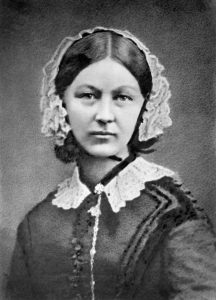Event News
International Nurses Day (12 May) and Florence Nightingale

Every year on May 12, the world commemorates International Nurses Day. It commemorates Florence Nightingale’s birth, who was born on May 12, 1820. The founder of modern nursing, Florence Nightingale, was an English social reformer, and statistician.
During the Crimean War, Nightingale rose to prominence as a manager and teacher of nurses, organizing treatment for wounded soldiers in Constantinople. She popularized nursing and became a symbol of Victorian culture, especially as “The Lady with the Lamp,” who made night-time rounds of wounded soldiers.
Every year, the International Council of Nurses (ICN) selects a theme and produces IND resources and facts to educate the public and encourage nurses. Some of those resources include reports, case studies, posters, videos, interviews, and social media banners and logos.
The theme for International Nurses Day 2021 (IND2021) has been decided by the International Council of Nurses as ‘Nursing The World Back to Health,’ emphasizing the ‘true value of nurses to the people of the world. The sub-theme being ‘A Vision for Future Healthcare’.
The IND2021 Theme
The IND2021 theme reflects the effect of COVID-19 on the healthcare system and nursing profession and how both could be influenced in the future. As the largest healthcare sector, nurses must be involved in the planning of the industry’s future.
“The global COVID-19 pandemic has shown to the world the critical role that nurses play in keeping people safe throughout their lives,” said Annette Kennedy, President of the International Council of Nurses.
“While there has been a lot of change in the healthcare industry, there has also been a lot of creativity that has increased access to treatment. We’ll be focusing on nursing improvements and advancements in 2021 and how they’ll impact the future of healthcare.” Annette said.
How it Started

Modern nursing, which we now take for granted, was not always so organized until Nightingale arrived on the scene. Nightingale had volunteered to nurse British and allied soldiers in Turkey during the Crimean War, much against her family’s wishes. After hearing horrifying stories of how injured allied troops were being treated inhumanely, she and her team braved the difficult terrain.
Nightingale spent a lot of time in the hospitals, and her night rounds, which she did with one hand holding the lamp aloft while giving personal attention to the injured, established her as the “Lady with the Lamp.” She worked hard to make nursing education more formal. In 1860, she helped found the Nightingale School of Nursing at St. Thomas’ Hospital in London, which was the first scientifically based nursing school.
The Florence Nightingale Pledge, taken by new nurses, and the Florence Nightingale Medal, the highest international distinction a nurse can receive, were named in her honour. The annual International Nurses Day is held on her birthday in memory of her pioneering work in nursing. Her social reforms included:
- Expanding the appropriate types of female participation in the workforce.
- Improving healthcare for all parts of British society.
- Campaigning for better hunger relief in India.
- Helping to dismantle harsh prostitution laws for women.
A multi-talented author
Nightingale was a prolific and multi-talented author. Most of her published work during her lifetime was devoted to the dissemination of medical information. Some of her tracts were written in plain English so that even those with limited literacy skills could understand them.
She was also a pioneer in data visualization, using infographics to display statistical data in a graphical format easily. Many of her works, including her extensive work on faith and mysticism, were only published after passing away. Not surprisingly, Nightingale was the first woman to receive the British Empire’s Order of Merit (1907).

How is International Nurses Day Celebrated?
Countries around the world commemorate this day in their unique ways. In the United Kingdom, for example, each year, a service is held in Westminster Abbey in London during which a symbolic lamp is passed between nurses until it enters the Nurses’ Chapel, where it is then placed on the High Altar. This represents the transmission of information from one nurse to the next.
Both graduates (including those with a bachelor of nursing degree and a diploma in nursing) and undergraduates studying a nursing course across the world also celebrate May 12 in various ways in their schools.
In a Nutshell
The contribution of Florence Nightingale to mankind is undeniable. And that’s one of the reasons why many are joining the nursing workforce every year.
For those who are inspired by the story of Florence Nightingale and aspire to be a nurse one day, feel free to check out the nursing course (including Bachelor of Nursing Degree and a Diploma in Nursing) offered by AIMST University.

